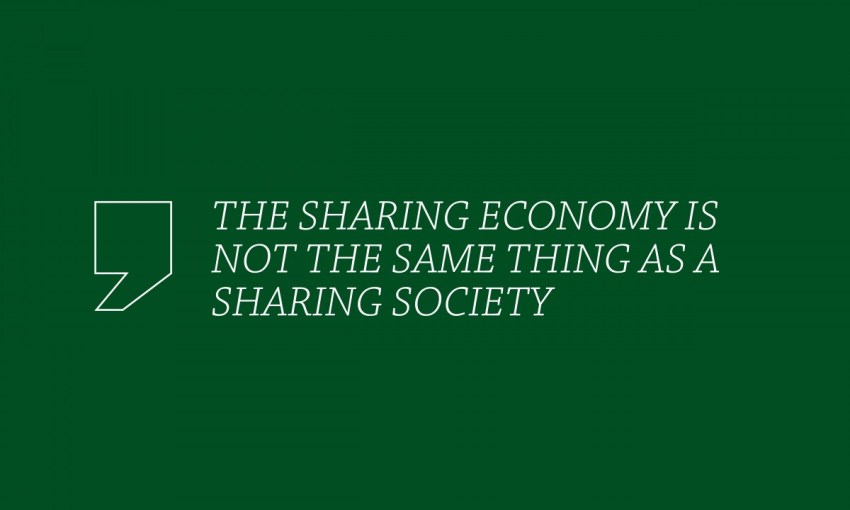The Sharing Economy is actually all about being selfish.
The Sharing Economy is a lie
A couple of months ago, three of my friends deleted Uber on the same day.
It wasn’t because Uber CEO Travis Kalanick seems to be a (possibly estranged… though maybe not really estranged) friend of President Trump, although that would’ve been a good reason.

Farrin Foster is CityMag’s editor
Instead – it was because all three of them had finally got fed up with Uber’s long-term business plan. Travis’ strategy seems to involve getting rid of drivers altogether in favour of a driver(and therefore driver paycheque)-free future in which autonomous, self-operating cars deliver his company’s service. This is something that Donald’s mate Travis denies, for what it’s worth.
Deleting Uber is a good thing to do. There’s the reason cited by my friends, the aforementioned Trump proximity, and the fact that even while Uber drivers are still in the picture, it’s very difficult for them to make a living wage.
And then there’s all the issues that come with UberEats.
But, I still have the app.
Part of the reason I still have the app is that I’m not very good at being a good person. Most of the time, it’s only when I’m looking directly at the consequences of broad scale problems that I can bring myself to do something about it. That’s why I’m not a vegetarian, even though I definitely believe I should be. If I lived next door to an abattoir, I would be a vegetarian.
Another part of the reason I still have the app is that the sharing economy often offers goods and services (like delicious food magically appearing in my lounge room) cheaper than the boring old regular economy can offer them. That’s because the sharing economy circumnavigates all those old institutions like tax, minimum wages, work cover, yadda, yadda, yadda, blah, blah, blah.
But, for someone like me – a worker who is part of that other new great buzz-wordy economy of the future, the gig economy – the decision between cheap and expensive is actually the same as the decision between cheap and nothing at all.
But the final reason I haven’t deleted the app is a reason that is not so much about me, and much more about the way the sharing economy has been marketed to us all.
Although it’s very tattered, in my brain, there’s a semblance of the original description of the sharing economy still floating around.
The sharing economy, according to its initial proponents, is supposed to be a means by which resources – as they become ever more scarce – can be efficiently used by everyone. Under this logic, Uber is really a service where an accountant on the way home from work activates the app and uses it to pick up a couple of people heading in the same direction. The money he makes covers his petrol and adds a little to his regular wage.
But, you, me, your Grandmother, even these dogs – we all know that’s not what is going on.
People are buying Uber-compliant cars just to be able to drive for the company to try to make a living. They’re not sharing resources they already have, they’re trying to find themselves a job. And while they’re doing it, everyone’s buddy Travis Kalanick is making loads and loads of cash.
This week, the State Government announced a $100,000 prize, co-funded by Airbnb, to be awarded to disruptive local start-ups. While I’m not excited by the sharing economy, I do think you have to work with what you’ve got, especially when your state’s economy could use a little more energy. So, you know, it seems like an ok idea.
Meanwhile – Airbnb, in the original conception of the sharing economy, has a similarly rosy imaginary mode of operation in which people open up their spare rooms to grateful travellers. It’s sort of like a democratisation of property. In reality, of course, Airbnb can – in some cases – encourage people to buy up investment properties and rent them out at sky-high rates that makes them only accessible to travellers. This makes it even more difficult for residents of already over-populated cities (like San Francisco or Melbourne) to find a home.
And, of course, while that’s happening, Airbnb is developing a value of $31 billion USD.
Despite what we’re told, Uber, and most of the other things operating under the sharing economy banner are really just ways for a few people to make heaps more money without the bother of pesky things like worker’s rights and taxes. If the sharing economy were a movie, it would be called Capitalism 2.0: The Return of the Rich White Man.
The sharing economy is lying to us, trying to make us think it’s the same thing as a Share Society. But nothing built around money is ever really about sharing.




